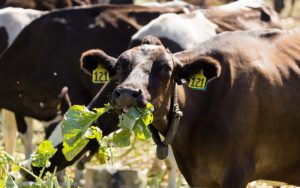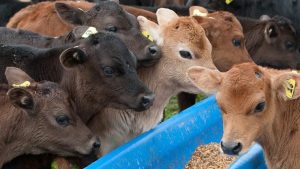
Southland dairy farmer asks more Kiwi workers to step into the industry. Abe de Wolde is seeking three more people to work on his dairy farms in 2ic positions but cannot find Kiwis to do the job. [File video]
Dairy NZ said recent labour surveys indicated that the dairy sector was short of 2000 to 4000 workers, the statement said.
New Zealand has its lowest unemployment rate since 2007, at 3.4 per cent. A low unemployment rate and closed borders meant massive labour shortage on farms, DairyNZ strategy and investment leader for farm performance Nick Robinson said.
Matt Zanderop, a dairy farmer in Waikato, said he had recently advertised for a local part-time position on his farm but that no one applied because there were no locals workers available to fill such posts.
He had been hosting international agriculture students for the past decade on his farm, especially during calving season, but he could not host them this year due to border restrictions.
“These students are integral to our operation. When one doesn’t have outside help there is a lot of pressure. Farmers are already jacks of all trades but without outside help we are wearing multiple hats at once and you are always on your toes. Not knowing if we can get workers is also causing future planning challenges,” he said.
Two extra workers on the farm in busy times meant almost two-and-a-half hours were cut from every working day, he said.
“Even novice outside help means the usual 12 to 13-hour day in a busy season can be cut to 10 to 11 hours. That extra two hours adds up to a lot of extra work over an entire week,” he said.
Zanderop said student visas were only valid for 90 days.
“International workers do more for an economy than just help on a farm. Students go out together and support local businesses. They also travel in their off time and spend money in other towns,” he said.
Ben De’Ath, managing director for The Regions, a company that supports the dairy industry with migrant workers, wrote an open letter in 2017 to the-then Minister of Immigration stating that New Zealand was short of dairy workers.
The problem was massively exacerbated by the pandemic, he said.
He said increased demand for New Zealand dairy products meant an increase in milk production and a subsequent increase in demand for dairy farm staff.
“I know of about 2000 vacancies on dairy farms. With the New Zealand employment rate so high there is very little unemployment in the locations where these vacancies exist. Kiwis cannot fill it. There may have been a lot of immigrants to New Zealand over the past years but it was mostly to cities. A local diaspora of younger people from rural areas to cities also made a dent in possible employees,” he said.
Besides dairy workers, thousands of working holiday visa holders also contributed to farm labour and these visa-holders were also not available due to border restrictions, he said.
“The result of understaffed farms is catastrophic for the mental well being of farmers and their families, marriage well-being and staff mental health. It also affects sharemilkers who in essence should become buyers but don’t want to buy into understaffed operations. Succession planning is also affected as families often do not want to take over a farm as it is understaffed and would rather do non-farming jobs,” De’Ath said.
He said when owner operators did general farm work because of staff shortages, environmental issues on farms and animal welfare challenge also surface.
“The only way one can make the public understand this is to say that an owner who only manages to deal with the day-to-day work because of staff shortages is like a CEO of a company being stuck doing data entry because there is no one else to do it. The work is still important but management decisions are neglected,” De’Ath said.
The Government recently announced that 200 international dairy workers would be allowed into New Zealand on a dairy class border exemption. It removed restrictions on how many farm assistants, herd managers and assistant managers could make up the quota of 200 workers, and allowed applications for all roles.
























